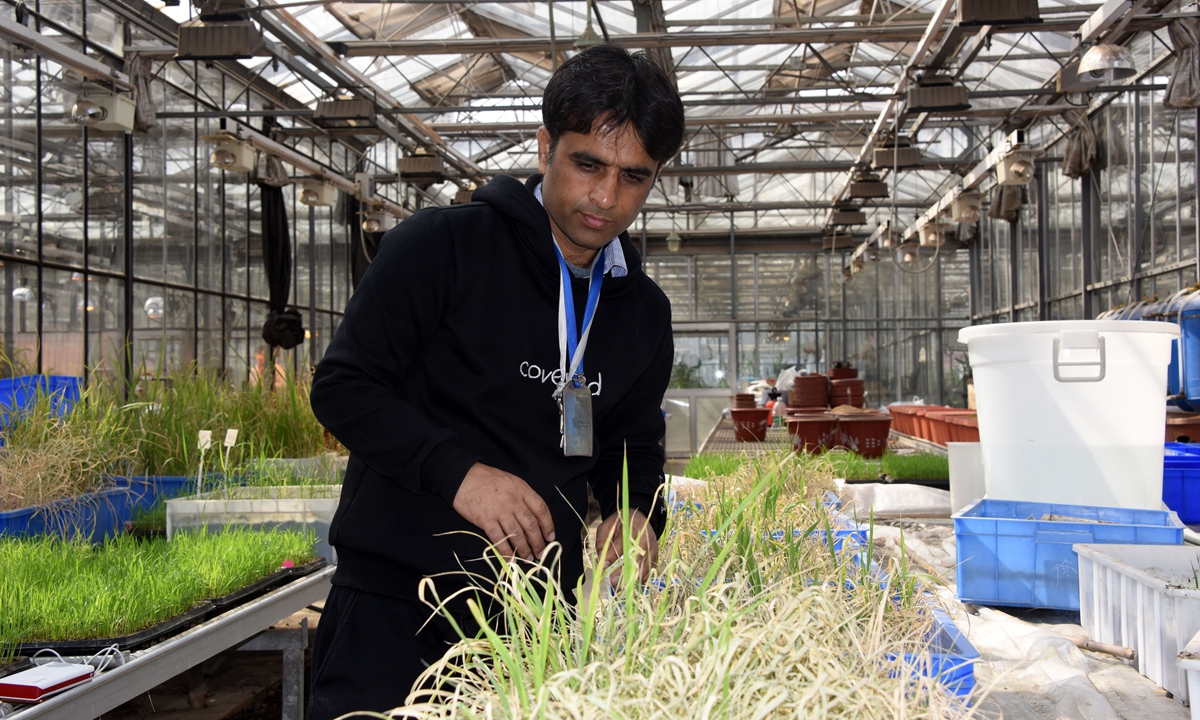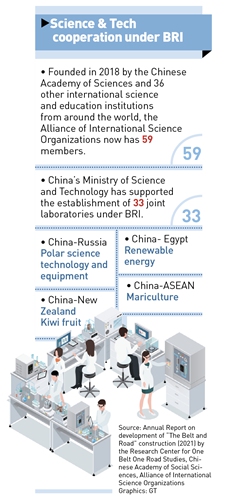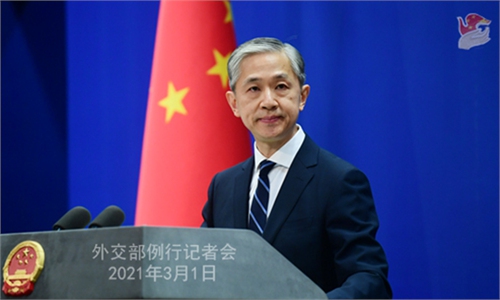China’s high-speed rail, 5G, nuke generators used by more countries
BRI cooperation progressing

Pakistan researcher Shahzad Amir Naveed checks haloduric rice breeding in an experimental greenhouse in April 2019. China's Ministry of Science and Technology has sponsored young foreign professionals from BRI countries to travel to China for technology and cutlural exchange from 2013. Photo: cnsphoto
The US' crackdown on China's technology sector will not dampen China's cooperation on science and technology innovation with countries joining the Belt and Road Initiative (BRI).Achievements have been continuously notched up under the significant supports of sci-tech innovation partnerships under the initiative, according to an upcoming annual report seen by the Global Times.
The US assault reflected that China's rising prominence in science and technology that has challenged US dominance in the technology sector. Chinese technology has been adopted and widely recognized by an increasing number of BRI countries, squeezing the market share of some US companies, Beijing-based technology analyst Liu Dingding told the Global Times on Wednesday.
Popular initiative
According to the Annual Report on development of "The Belt and Road" construction (2021) by the Research Center for One Belt One Road Studies, Chinese Academy of Social Sciences, which will be published soon, cooperation focused on science and technology between China and BRI countries has been deepened and expanded following the rollout of joint laboratories and science parks under the BRI.
So far, BRI has attracted 65 economies to join, covering a total population of 4.6 billion people, or 62 percent of the world's total population, as outlined in the annual report. The total land area of the countries involved in the initiative reached 50 million square kilometers, or 39 percent of global landmass. Their combined GDP totaled $23 trillion, accounting for 31 percent of global GDP.
"Science and technology innovation, as the major driving force for social and economic development, has played a significant role for BRI cooperation," read the annual report seen by the Global Times.
Science and technology centered innovation under the BRI provides a significant platform for Chinese enterprises to develop businesses in a global setting, leading China to successfully develop a range of core technologies which are proving to be internationally competitive including high-speed railways, new-generation nuclear power technology, and 5G, the annual report outlined, highlighting the important role of Chinese science and technology enterprises for BRI countries as they now have the ability to share their services and provide supports to other BRI economies.

Great achievements
China has made great effort to help some BRI countries in upgrading digital infrastructure to create new opportunities and growth points for their economic development, as well as collaborate with local telecom operators to roll out 5G basic stations.
China's telecom giant Huawei has been cooperating with Namibia's main telecommunications firm MTC and helped the country launch Africa's first 4.5-G mobile network in 2016, the Xinhua News Agency reported.
According to Huawei's official website, South Africa's largest mobile operator has launched Africa's first standalone 5G network jointly with Huawei in July 2020, allowing the provider to significantly enhance its fixed wireless broadband (FWA) service experience in all covered areas.
And, Hualong-One Karachi unit 2, which is developed by China, was officially put into commercial operation in Karachi, Pakistan in May this year, marking the first Chinese developed third-generation advanced nuclear power generator installed overseas, people.cn reported.
The construction of the Karachi Nuclear Power Project has provided a tangible boost to the development of local economy and the country's broad industries, according to people.cn.
The supply of equipment in Pakistan has increased significantly due to the nuclear project. The project construction created more than 10,000 local jobs directly, with another 40,000 job positions being created indirectly.
The Jakarta-Bandung High Speed Railway is another landmark project under the BRI which is jointly built by China and Indonesia, connecting the capital city of Jakarta with the fourth largest city of Bandung.
The railway is approximately 142 kilometers with a maximum design speed of 350 kilometers per hour. The commuting time between the two cities will be shortened from the current three hours to 40 minutes. As of April, 71 percent of the project has been completed, the People's Daily reported.
Besides the major achievements and progress made in high-speed railways, nuclear power technology and 5G, China has been working with BRI countries to establish science parks and joint laboratories to enhance communication and information exchange, Wang Yiwei, director of the institute of international affairs at Renmin University of China in Beijing, told the Global Times on Wednesday.
According to the annual report, around 180,000 scientific and technology personnel have travelled to China to engage in exchange and training programs. In total, the sci-tech innovation partnerships have offered support for more than 8,300 young foreign scientists to work in China. Meanwhile, China has been discussing setting up national science parks with eight countries including Mongolia, Vietnam and South Africa.
Challenges ahead
Both Wang and Liu pointed out that the cooperation in science and technology between China and BRI countries still has significant untapped potential.
However, some challenges remain.
Even though analysts stated that the US' suppression of China's technology sector and crackdown on Chinese high-tech firms will not significantly dampen the cooperation between China and BRI countries, Liu said that Chinese companies which include Huawei are still facing challenges as a result of restrictions imposed by the US and some other countries.
The annual report also indicates that the differences in culture, law, and systems among BRI countries which may create complexities for Chinese enterprise when they enter local markets.



